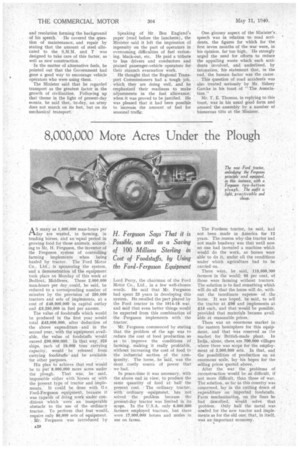8,000,000 More Acres Under the Plough
Page 22

If you've noticed an error in this article please click here to report it so we can fix it.
H. Ferguson Says That it is Possible , as well as a Saving of 100 Millions Sterling in Cost of Foodstuffs, by Using the Ford-Ferguson Equipment
AS many as 1,000,000 man-hours per day are wasted, in fanning, in tending horses, and an equal period in growing food for those animals, according to Mr. H. Ferguson, the inventor of the Ferguson system of controlling farming implements when being hauled by tractor. The Ford Motor Co., Ltd., is sponsoring the system, and a demonstration of the equipment took place on Monday of this week at Bedfont, Middlesex, Those 2,000,000 man.-hours per day:could, he said, be reduced to a corresponding number of minutes by the provision of 250,000 tractors and sets of ,implements, at a cost of 248,000,000 in capital outlay and 43,250,000 in fuel per annum.
The value of foodstuffs which would be produced in the first year would total 243,000,000, after deduction of the above expenditure and in the second year, with the equipment available, the value of foodstuffs would exceed 290,000,000. In that way, _325 ships, each of 10,000 tons carrying capacity, would •be released from carrying foodstuffs and be available for other purposes.
His plan to achieve that end would be to put 8,000,000 more acres under the plough. That was, he said, impossible either with horses or with the present type of tractor and implements. It could be done with ti e Ford-Ferguson equipment, because it was capable of doing work Under conditions which were an insuperable obstacle to the use of the ordinark tractor. To perform that feat would, require only 80,000 sets of equipment. Mr. Ferguson was introduced by Lord Perry, the chairman of the Ford Motor Co., Ltd., in a few well-chosen words. He said that Mr. Ferguson had spent 23 years in developing this system. He recalled the part played by the Ford tractor in the 1914-18 war, and said that even better things would be expected from this combination of the Ferguson implements with the tractor.
Mr. Ferguson commenced by stating that the problem of the age was to reduce the cost of food production so as to improve the conditions of farming, making it really profitable, without increasing the cost of food to the industrial section. of the community. The horse,. he "said, was the most costly source of power that we had. • In peace-time it was necessary, with the above end in view, to produce the same quantity of food at half the present cost. • The ordinary tractor, with ordinary • equipment,, has not solved the problem because the present-day tractor was limited in its scope. In the U.S.A. only 6,000,000 farmers employed tractors, but there were 17,600,000 horses and mules in use on farms. The Fordson tractor, he said, had not been made in America for 12 years. The reason why the tractor had not made headway was that until now no one had invented a machine which would do the work, as horses were able to do it, under all the conditions under which agriculture had to be carried on There were, he said, 115,000,000 . farmers in the world; 95 per cent, of those were farming without tractors. The solution is to find something which will do all that the horse will do, without the inordinate expense of the. horse. It was hoped, he said, to sell the tractor at 2.98 and implements at 215 each, and that would be possible, provided that materials became available at reasonable prices.
There was an enormous market in the eastern hemisphere for this equipment, and that was reserved as he market for British-made plant. In India, alone, there are 700,000 villages where there was scope for the employment of 2,006,000 sets. In that, and the possibilities of production on ad enormous scale, lay his hopes for the selling prices quoted above.
After the war the problems of reconstruction would be as difficult, if not more difficult, than those of war. The solution, so far as this country was concerned, lay in the cutting down of expenditure on imported foodstuffs. Farm mechanization, on the lines he had described, Auld solve that problem. Only half the metal was needed for the new tractor and implements as for the old one; that, in itself, was an,important economy.




























































